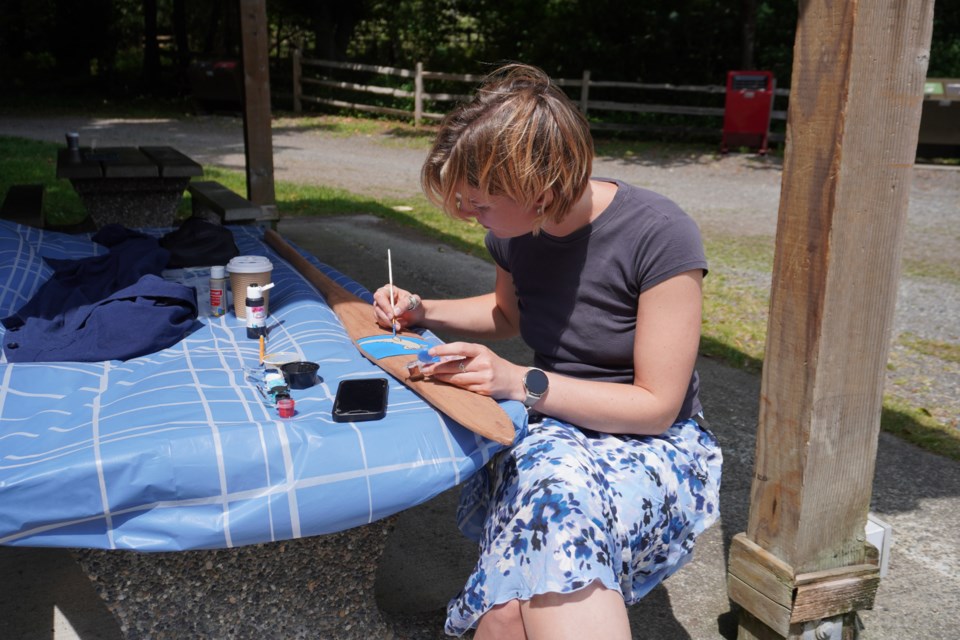Community members and municipal staff have been participating in the Paddles Across Canada program over the past several months.
The municipality (BIM) partnered with the International Sustainability Education Foundation (ISEF) and the Squamish Ocean Canoe Family to carry out the project. The program is a way for municipalities and other organizations to bolster cultural connections with local Indigenous communities. In this instance Bowen Island collaborated with Squamish Nation, the traditional ancestors of the island of Nex̱wlélex̱wm.
During the course of several months participants have attended workshops which include traditional blessings, storytelling, knowledge and meal sharing, and crafting a paddle from start to finish. This includes hand carving, sanding, painting, and in Bowen’s case, making sure the paddles are designed to cut through the thick kelp which can be found in the waters of the Salish Sea.
Tess Taylor, emergency program coordinator with BIM, discovered the Paddles project while searching for a way to use provincial funding meant to incorporate Indigenous Cultural Safety Training into a municipality’s Emergency Program. When Taylor saw North Shore Emergency Management taking part in the program, she decided to bring the experience to Bowen. Workshops began earlier this year, and last week people were putting the finishing touches on their paddles during a lunch and working session at the Bowfest Field.
“It’s been a highly satisfying and enriching experience,” says Taylor.
In total 52 people took part in the Bowen portion of the project. Participants included members of BIM council and staff, Bowen Island Fire Department, the Emergency Operations Centre and Emergency Support Services, Neighbourhood Emergency Response Program, and Emergency Planning and Response Members from Squamish Nation.
Jonathon Reynolds is the executive director of ISEF, which will celebrate the 10th year of the Paddles program operating across Canada in 2026. Reynolds estimates around 12 to 15,000 paddles have been crafted during that time, including a major push with North Shore municipalities over the past two years. Other groups taking part regionally include firefighters, police, administration staff, and libraries.
“Anybody who interacts with people, because this has been mostly a form of truth and reconciliation where there’s been a lot of sharing,” explains Reynolds on which groups are good candidates for the program. “A big part of it is learning how to see each other as us, as opposed to us in them… Breaking down barriers is really important.”
“There’s the concept of all paddling in the same canoe. If you paddle in a large canoe you have to paddle together. You have to work together until we’re all going the same direction,” he adds.
Reynolds says it was clear the Bowen participants were eager to tackle the project. “It’s been amazing. After the first one (workshop) we thought it can’t get any better, and then the next group came in and it was just as good if not better. And it just kept growing.”
“I think part of it is because Bowen is its own unique little place… A lot of people knew each other already so that really helped. And there seems to be an openness here to new ideas and other people’s thoughts... There’s a real enthusiasm on Bowen for learning and for looking at things from a different perspective,” says Reynolds.



